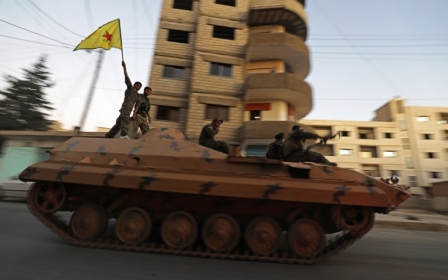Turkish assault takes hill near Syria's Afrin from Kurdish militia
Turkey on Sunday seized strategic high ground from Kurdish militia in Syria, pressing ahead with a campaign that has strained relations with the United States.
After several days of poor visibility amid heavy rain and fog, Turkish warplanes and artillery took advantage of clear skies and seized Mount Barsaya near the Kurdish town of Afrin in northwestern Syria, the military command said in a statement.
The hill is significant because it overlooks the towns of Kilis and Azaz, on either side of the Turkish-Syrian border. Still, more than a week into their offensive, Turkey and allied Syrian rebel groups have made only modest progress fighting into hilly terrain against entrenched foes, Reuters reported.
The US-backed Syrian Democratic Forces, an alliance of militias of which the YPG is the strongest, said earlier on Sunday that there was intense fighting in the area.
Turkey launched operation "Olive Branch" on 20 January against the Syrian Kurdish People's Protection Units (YPG) in Afrin, supporting Syrian opposition fighters with ground troops and air strikes.
While Turkey brands the YPG a "terror" group, the militia had received support from the US as its fighters spearheaded the battle against the Islamic State (IS) group across swathes of Syria.
In spite of souring relations with NATO ally Washington, Turkey’s President Recep Tayyip Erdogan has threatened to expand the offensive against the YPG to Manbij, east of Afrin.
In a speech on Sunday, Erdogan said that Turkey will "clean" its entire border with Syria, a possible sign that the offensive may be extended further, Reuters said.
Syrian Kurdish officials have pledged to meet any wider Turkish assault with an "appropriate response".
As the Turkish campaign renders prospects for peace in Syria even fainter, authorities in the war-torn country's Kurdish autonomous region said they will not attend peace talks in Russia.
"We said before that if the situation remained the same in Afrin we could not attend," regional official Fawza al-Yussef said.
Turkey is one of the sponsors of the planned talks in the Black Sea resort of Sochi on Monday and Tuesday, along with Damascus allies Russia and Iran.
Turkey's air and artillery strikes on Sunday were even fiercer than previous days, said an AFP correspondent on the Syrian-Turkish border who saw towers of smoke rising into the sky.
Turkish channel NTV broadcast live footage Sunday showing rocket fire targeting Mount Barsaya.
Turkish troops and their Syrian opposition allies said last Monday they had captured the hill, before losing it again a few hours later.
Syria's antiquities department said on Sunday that Turkish air strikes have damaged a 3,000-year-old temple in the country's north.
"This attack reflects the hatred and barbarism of the Turkish regime against the Syrian identity and against the past, present and future of the Syrian people," a statement on the government agency website said.
Turkish relations with the US have dipped over their stances on the YPG - which Ankara says is a "terrorist" offshoot of the outlawed Kurdistan Workers' Party (PKK).
The PKK, which has waged a war against the Turkish state for three decades, is proscribed as a terror group by Ankara and its Western allies.
US President Trump earlier this week urged Erdogan to "de-escalate" his forces' assault on Afrin as he expressed concern about "the destructive and false" anti-American rhetoric emanating from Turkey.
Adding fuel to the fire, Turkey's Foreign Minister Mevlut Cavusoglu on Saturday urged the US to "immediately withdraw" its personnel from Kurdish-held Manbij, which Ankara has also threatened to attack.
"We are going to cleanse Manbij" after Afrin, government spokesman Bekir Bozdag said Sunday, according to Anadolu.
Manbij was retaken from IS by the Kurdish-led Syrian Democratic Forces in 2016 as part of a push that would later recapture the city of Raqqa from the militants.
Faced with the Turkish onslaught, the YPG's political arm, the Kurdish Democratic Union Party (PYD), appealed to the international community to pressure Ankara into halting its offensive.
Seven Turkish soldiers have died since "Olive Branch" was launched, Erdogan said, while about 40 others have been wounded.
One soldier who was killed on Saturday was buried on Sunday in Istanbul.
The fighting has also led to a heavy loss of civilian lives.
According to the Britain-based Observatory, 42 civilians have been killed since 20 January, including 12 children, most of them in Turkish air strikes.
Ankara denies shelling any civilian areas.
In a sign of the sheer ferocity of the fighting, 69 pro-Turkish rebels were killed, as were 66 Kurdish fighters.
Earlier this month, the US-led coalition fighting IS said it was working to create a 30,000-strong border security force in northern Syria, which would include the YPG.
Several nations, including Germany and France, as well as the European Union, have expressed concern over the Turkish offensive against a country where over 340,000 people have already been killed since war erupted in 2011.
Stay informed with MEE's newsletters
Sign up to get the latest alerts, insights and analysis, starting with Turkey Unpacked
Middle East Eye delivers independent and unrivalled coverage and analysis of the Middle East, North Africa and beyond. To learn more about republishing this content and the associated fees, please fill out this form. More about MEE can be found here.




